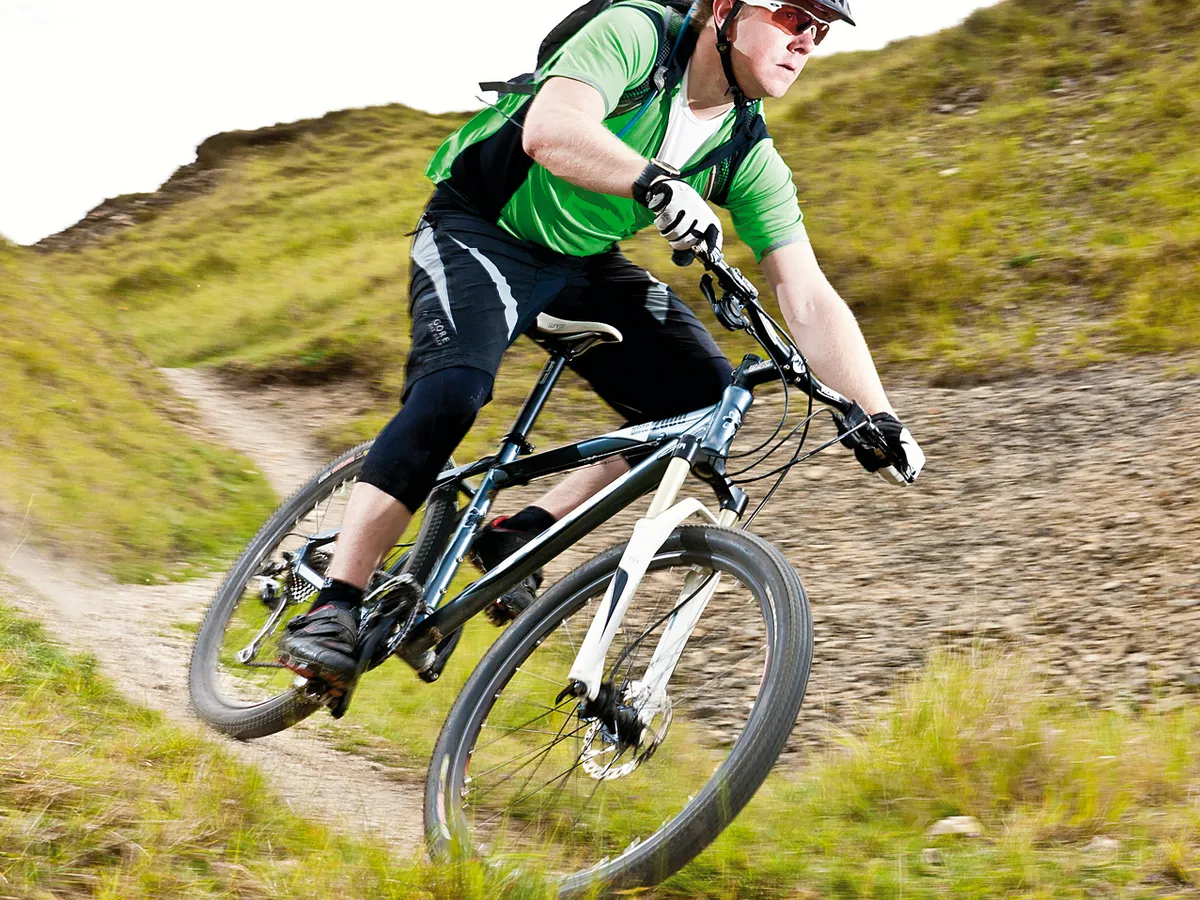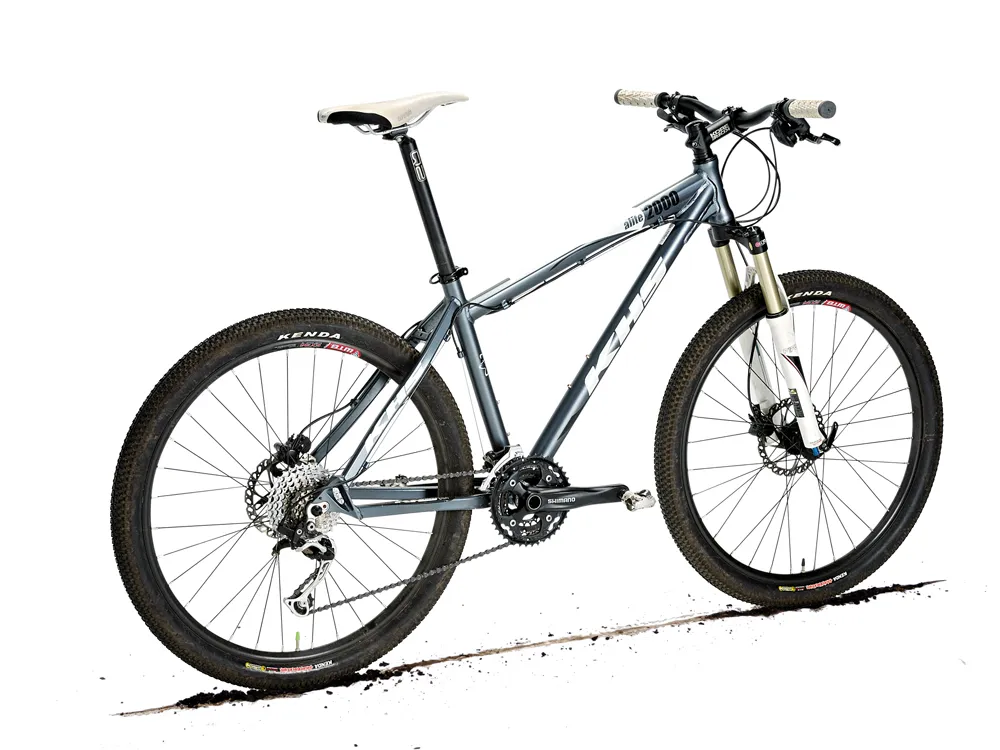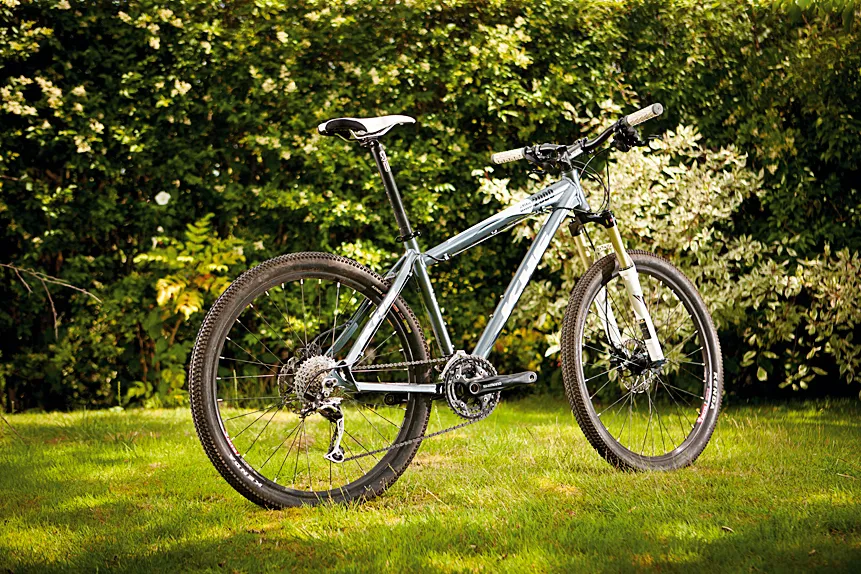In the last few years KHS UK has had cleverly equipped unsung hero bikes in the range. This is one of them. While prices have risen slightly since the UK importer started selling through independent dealers, the Alite 2000 is still superb value compared to most of its price competitors. An RST air fork, 30 gears and the low weight set it apart from price rivals, and it rides superbly.
The Alite 2000 is a bike that looks and feels as though some serious thought has gone into the componentry specification. We couldn’t find anything to moan about. If the RST First air fork’s longer term durability is as good as its initial trail feel, we’d like to see it on a lot more bikes.
Ride & handling: Great for flicking through high-speed singletrack
The Alite 2000 rides as well as the majority of £1000 hardtails we’ve tested, but for £200 less. It accelerates and climbs fast, it’s comfortably confident on any trails, the handling is reassuringly neutral and the fork is well controlled enough to tackle the sort of terrain that often presents a challenge to bikes around this price... although it takes a while to get used to the sound of the asthmatic gerbil seal wipers in each leg.
With many £800 bikes tipping the scales at closer to 30lb than 25lb, the 25.7lb weight of the KHS is a highlight that makes its presence felt, and not just on climbs. Combined with fast rolling tyres and the smooth air spring of the fork, this is a bike that flows singletrack superbly, accelerating out of corners and instantly back up to speed in a way that’s genuinely inspiring. Just watch out for the 12in bottom bracket height; it boosts overall stability but can catch you out on pedally corners.
Frame: Boosted front end impact resistance
The Alite 2000 frame uses fairly slimline tubes in the mainframe, with the low coffin shaped top tube and ovalised down tube merging and gusseted behind the head tube to boost front end impact resistance. The curvy box sectioned seatstays butt into the back of an extended seat tube and both the seat and chainstays have loads of heel clearance. The seat clamp faces forward, out of the rear wheel spray, and there are two sets of water bottle bosses.
Equipment: 30 slick-operating gears and better than average finishing kit
At this price it’s not easy for manufacturers to know exactly how much quality emphasis should be on the frame, the fork, the drivetrain, the wheels and the finishing parts. It’s hard, to the point of almost impossible, to get it all perfect so most bikes hit a perceived sweet spot price point by compromising in areas that might not be immediately obvious. Superficially, it’s tempting to think KHS has compromised on the fork here, but you shouldn’t judge all RST forks by the ones you’ll often find on low budget bikes.
RST’s First is a very classy air sprung fork that’s cheaper than a RockShox alternative for manufacturers to buy in. Compression and rebound damping are excellent, and adjustable, and the lockout lever on top of the right hand leg is very effective, leaving a small amount of compression to even out tiny bumps. The tracking is excellent too. We were really impressed with the trail feel of the RST First air fork on the KHS. Hopefully its longer-term durability will match first impressions.
The fact that the RST fork costs less for KHS to buy in than a RockShox fork opens up budget room for the rest of the kit, which is all good. The drivetrain uses a mix of 10-speed XT and SLX matched to a Shimano triple crankset with a hollow axle and outboard bearings. This provides as wide a range of gears as you’ll find on any MTB and shifting function is superb. With cassette sprocket tooth counts now going up to 36 in some cases and a lot of more racy bikes now opting for 2x10 gear set-ups, there’s no longer any excuse to get off and walk climbs on a bike like the KHS with its 24-tooth front, 34-tooth rear smallest gear.
Everyone on the test team was very impressed with the Hayes Stroker brakes too; the feel at the levers is a bit wooden but the power is excellent. Tough but light WTB-rimmed wheels are shod with fast-rolling Kenda Small Block Eight tyres, which work well in all but sticky mud. Every tyre is a compromise in that the grippiest tyres will often be the slowest rolling and the fastest rolling will often be slippery in the mud. The Kenda Small Block Eights are very fast and very grippy in the dry but the tiny close spaced knobs block easily in sticky mud.
A Kore stem and 27in low rise bar feel spot on and the WTB Silverado saddle is a slimline but comfy offering held tightly by a twin-bolt seat post.


